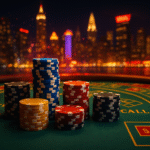
Poker is more than a game of cards; it’s a world of strategy, psychology, and decision-making. Beyond the chips and bluffs, poker reflects the essence of life itself. Every hand, every decision, and every interaction at the table Poker is more than a game of cards; it’s a world of strategy, psychology, and decision-making. Beyond the chips and bluffs, poker reflects the essence of life itself. Every hand, every decision, and every interaction at the table carries lessons that transcend the game. These lessons aren’t just about becoming a better player; they’re about becoming a more thoughtful, resilient, and strategic person in your everyday life.
Let’s dive deep into the seven life lessons you’ll learn from playing poker and how they apply to your personal and professional life.
Patience Pays Off
In poker, patience is a virtue. You might sit for hours folding hand after hand, waiting for the right cards to make your move. Impulsivity can lead to poor decisions and losses, while patience often brings long-term rewards. The same is true in life.
Consider a job hunt or building a business—success rarely happens overnight. The ability to delay gratification, wait for the right moment, and act decisively when the opportunity arises is crucial. Poker teaches you to endure the waiting game with grace and to recognize that sometimes, the smartest move is to do nothing at all.
In life, patience isn’t just about waiting; it’s about maintaining your focus and determination during the waiting period. Poker reinforces this mindset by showing how restraint and timing can turn the tide in your favor.
You Can’t Control the Cards, But You Can Control How You Play Them
Life is unpredictable. You don’t get to choose the family you’re born into, the economic conditions you grow up in, or the opportunities that come your way. Similarly, in poker, you have no control over the cards you’re dealt. What you can control, however, is how you play those cards.
A poor hand doesn’t have to mean a losing game. Skilled players can bluff their way to victory or minimize their losses with strategic play. In life, the ability to adapt to circumstances and make the most of what you have is a critical skill.
Imagine facing a setback, such as losing a job. You could see it as a disaster or an opportunity to pivot to something better. Poker teaches you to focus on your actions and mindset rather than lamenting what’s out of your control.
Risk and Reward Go Hand in Hand
At its core, poker is a game of calculated risk. Each bet is a decision based on the potential reward versus the probability of success. The best players understand when to push all-in and when to fold, based on their assessment of the situation.
This principle mirrors life’s biggest decisions. Whether you’re starting a new business, investing in a project, or pursuing a dream, there’s always a risk involved. Playing it safe might keep you comfortable, but it’s unlikely to lead to significant rewards.
Poker teaches you to take risks thoughtfully. You learn to evaluate the odds, gather information, and make decisions that balance risk and reward. This mindset helps you approach life’s uncertainties with courage and clarity.
Reading People Is as Important as Knowing the Rules
The rules of poker are simple, but the game itself is anything but. Much of poker’s complexity lies in its psychological aspect—reading your opponents, detecting bluffs, and predicting their next moves. A skilled player doesn’t just play the cards; they play the people.
In life, interpersonal skills are equally critical. Whether you’re negotiating a deal, resolving a conflict, or building relationships, understanding others’ emotions and intentions is invaluable. Poker sharpens your ability to observe subtle cues, interpret behavior, and respond strategically.
For example, imagine you’re in a business meeting. The ability to read between the lines, sense hesitation, or detect enthusiasm in others can give you a significant edge. Poker equips you with the tools to excel in these situations by teaching you how to observe, analyze, and act on what you see.
Embrace Failure as a Learning Opportunity
Even the best poker players lose hands—and sometimes, entire games. Bad beats are a part of the experience, and dwelling on them only hampers your performance in the long run. Instead, seasoned players focus on learning from their mistakes and improving their strategy for the future.
In life, failure is inevitable. Whether it’s a failed project, a rejected proposal, or a missed opportunity, setbacks can feel crushing. However, like in poker, these moments are also opportunities to learn and grow.
Think of every loss as a lesson. What could you have done differently? How can you adjust your approach next time? Poker instills the resilience needed to bounce back from failure and the humility to learn from it.
Money Management Is Crucial
In poker, your bankroll is your lifeline. Mismanaging it—betting too much on a single hand or failing to set limits—can quickly lead to disaster. Successful players know how to budget their chips, ensuring they can stay in the game even during rough patches.
This lesson is directly applicable to personal finances. Living within your means, saving for the future, and making thoughtful financial decisions are essential for long-term stability. Poker teaches you the discipline to manage resources wisely, resist impulsive spending, and plan for the future.
Whether you’re saving for a house, investing in your education, or planning for retirement, the money management skills you develop at the poker table will serve you well in real life.
Stay Calm Under Pressure
Poker is a high-pressure game. A single decision can mean the difference between winning a fortune and losing it all. In these moments, staying calm and thinking clearly is essential.
The ability to manage stress and keep your emotions in check is a valuable skill, both at the table and in life. Whether you’re facing a tight deadline, a critical decision, or an unexpected challenge, emotional control helps you stay focused and make rational choices.
Poker trains you to embrace pressure rather than fear it. You learn to focus on the task at hand, block out distractions, and trust your abilities even in the most intense situations.
The Table as a Mirror of Life
Poker is more than just a game; it’s a mirror reflecting life’s complexities. Every hand teaches you something about yourself—your patience, resilience, decision-making, and ability to adapt. The lessons you learn at the table don’t just make you a better player; they make you a better person.
So, the next time you sit down to play poker, remember: you’re not just competing for chips. You’re gaining insights, developing skills, and preparing for the challenges of life itself. Whether you win or lose, the wisdom you take away is the real jackpot.
Are you ready to shuffle up and deal? Life’s table is always open, and the lessons are endless. Let’s play.




























